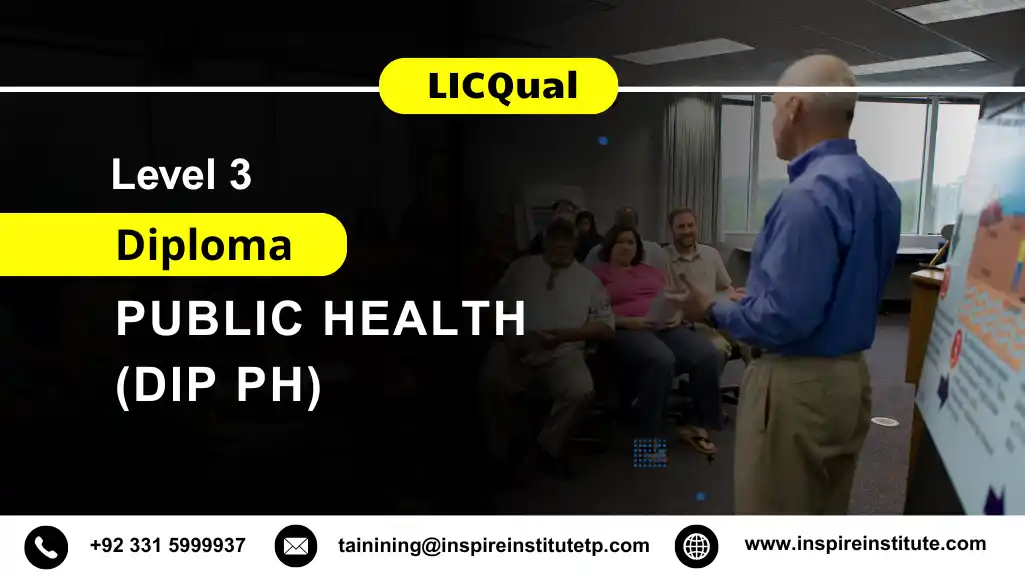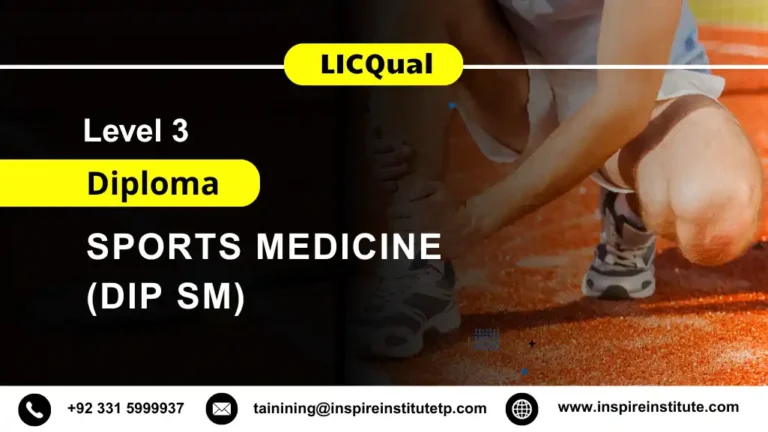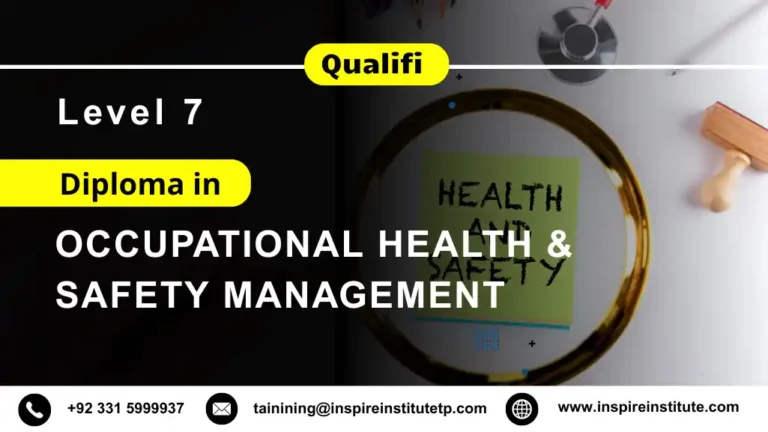LICQual Level 3 Diploma in Public Health (Dip PH)
The LICQual Level 3 Diploma in Public Health (Dip PH) is a UK-accredited programme designed to equip healthcare professionals and aspiring practitioners with the essential knowledge and skills needed to address today’s most pressing public health challenges. With global health risks, chronic diseases, and community well-being at the forefront of healthcare priorities, this diploma provides learners with a strong foundation to drive effective public health initiatives.
This course focuses on key areas of public health, including disease prevention, health promotion, epidemiology, and environmental health. Learners will explore how social, economic, and cultural factors influence population health and develop strategies to improve health outcomes at local, national, and international levels. By engaging with evidence-based practices, students gain the tools to design, implement, and evaluate public health programmes that make a lasting impact.
The LICQual Level 3 Diploma in Public Health blends theoretical knowledge with practical applications, making it highly relevant for those aiming to work in public health services, healthcare systems, NGOs, and government sectors. Learners gain a deeper understanding of how to analyse health data, assess community needs, and contribute to policies that enhance public well-being.
Throughout this assignment-based qualification, learners will develop strong analytical, critical thinking, and problem-solving skills. These competencies are vital for addressing real-world public health concerns such as infectious disease control, chronic disease management, nutrition, and health education. The flexible structure of the programme makes it ideal for professionals balancing work commitments with academic growth.
Graduates of this diploma are well-positioned to pursue careers in healthcare organisations, public health departments, and international health agencies. The UK-recognised qualification enhances employability, credibility, and career progression, opening doors to roles in health promotion, epidemiology, policy-making, and community health leadership.
The LICQual Level 3 Diploma in Public Health (Dip PH) not only prepares learners to respond effectively to public health issues but also empowers them to become proactive leaders in building healthier, more resilient communities worldwide. This course is a gateway to professional growth and impactful contributions to society’s well-being.
Why Choose this Qualification
The LICQual Level 3 Diploma in Public Health (Dip PH) is a UK-accredited qualification designed for healthcare professionals, workers, and community practitioners seeking to enhance their knowledge and practical skills in health promotion, disease prevention, and population health management. This course combines advanced theoretical learning with practical applications, enabling learners to understand public health strategies, epidemiology, health education, and community-based interventions essential in improving population health outcomes. Designed as an assignment-based programme, it provides flexibility for professionals balancing workplace responsibilities with further education.
Key Reasons to Choose this Qualification:
Specialist Knowledge: Gain a comprehensive understanding of public health, including epidemiology, disease prevention, health promotion, and global health challenges. Learn evidence-based approaches to policy development, healthcare planning, and community engagement that improve outcomes across diverse populations.
Practical Application: Develop competence in assessing risks, planning interventions, managing health campaigns, and evaluating population-based health programmes. Learners also gain skills in data interpretation, health education, and collaboration with government and non-government organisations to strengthen community health.
UK-Accredited Diploma: Earn a UK-recognised qualification that validates expertise in public health and enhances professional credibility. Accreditation ensures alignment with international healthcare and public health standards, making this diploma valuable for healthcare professionals, public health officers, policy makers, and educators.
Flexible Learning Pathway: Benefit from an assignment-based structure that allows learners to progress at their own pace while continuing to work in healthcare, education, or community services. This flexible format is ideal for busy professionals seeking academic growth without compromising work commitments.
Evidence-Based Training: Explore current research, international health guidelines, and best practices in public health management. The programme emphasises effective health promotion strategies, preventive measures, ethical practice, and multidisciplinary approaches to tackling health inequalities and improving population well-being.
Career Development: Expand career opportunities in hospitals, community health services, NGOs, government health departments, and international health organisations. The LICQual Level 3 Diploma in Public Health equips learners with the expertise to contribute to health policy, disease prevention, and the advancement of global health initiatives.
The LICQual Level 3 Diploma in Public Health (Dip PH) empowers professionals with the knowledge, skills, and UK-accredited recognition necessary to make a meaningful impact on healthcare systems and communities. It is an essential qualification for those looking to advance their careers while promoting health equity, disease prevention, and population well-being on a global scale.
Course Overview
LICQual UK Awarding Body
Average Completion Time:
4-12 Months
Study Units: 6 Units
Evidence & Assignment Based
Mandatory Units
Who Should Take This Course
The LICQual Level 3 Diploma in Public Health (Dip PH) is a UK-accredited qualification designed for healthcare professionals who wish to develop advanced knowledge and practical skills in population health, disease prevention, and community health management. This course is ideal for practitioners aiming to improve health outcomes, implement evidence-based interventions, and progress within the specialised field of public health. It equips learners with in-depth theoretical insights and practical approaches to epidemiology, health promotion, policy development, and preventive healthcare, supporting both professional growth and improved quality of care in diverse health settings.
This course is suitable for:
Nurses and Community Health Practitioners: Professionals seeking to enhance their expertise in promoting health, preventing disease, and supporting individuals and communities to achieve better health outcomes.
General Practitioners and Physicians: Clinicians wishing to strengthen their skills in population health management, preventive care strategies, and multidisciplinary collaboration to optimise patient and community well-being.
Aspiring Public Health Specialists: Healthcare professionals preparing for higher-level qualifications or specialist pathways in public health, epidemiology, or global health who want to build a strong academic and professional foundation.
Policy Makers and Health Administrators: Individuals aiming to develop competencies in public health policy, programme planning, and evaluation to influence healthcare systems and address health inequalities.
Healthcare Educators and Trainers: Professionals interested in advancing their knowledge of public health to support teaching, research, or evidence-based training within healthcare and community health education.
Healthcare-Oriented Learners: Individuals with a professional interest in public health who wish to understand the principles of disease prevention, health promotion, and the role of public health in improving population well-being.
The LICQual Level 3 Diploma in Public Health (Dip PH) is particularly valuable for healthcare professionals seeking to specialise in community and population health, strengthen their expertise, and achieve a UK-accredited qualification. By combining evidence-based learning with practical application, this diploma supports career progression, professional recognition, and the ability to meet the growing demand for skilled public health practitioners in modern healthcare.
Course Benefits
The LICQual Level 3 Diploma in Public Health (Dip PH) provides significant benefits for healthcare professionals seeking to strengthen their expertise in population health, disease prevention, and health promotion. By combining advanced theoretical knowledge with practical application, this diploma equips learners to design effective health strategies, implement evidence-based interventions, and enhance community well-being. Designed as a flexible, assignment-based programme, it supports professional development while maintaining academic excellence and relevance in modern healthcare systems.
Key Benefits of the Course:
- Specialist Knowledge: Gain a comprehensive understanding of public health principles, epidemiology, health policy, and preventive healthcare strategies. Learners explore disease prevention, vaccination programmes, environmental health, and health education, enabling evidence-based decisions that positively impact community health.
- Practical Application: Develop competence in conducting health assessments, managing health promotion programmes, addressing health inequalities, and supporting population-level interventions. Learners also gain skills in data analysis, health communication, and implementing public health campaigns in diverse settings.
- Recognised Qualification: Earn a UK-accredited diploma that validates advanced expertise in public health and strengthens professional credibility. Accreditation ensures alignment with global healthcare and public health standards, making this qualification highly valued across clinical, community, and policy-driven roles.
- Flexible Learning Pathway: Benefit from an assignment-based study format that allows learners to progress academically while managing professional responsibilities. This flexibility is ideal for healthcare professionals and community health practitioners seeking further education alongside their work.
- Evidence-Based Training: Explore the latest research, global health reports, and public health frameworks, ensuring safe, effective, and scientifically sound practice. Learners are trained to apply preventive approaches, health surveillance methods, and policy-driven strategies to real-world health challenges.
- Career Development: Expand career opportunities in government health departments, NGOs, hospitals, research institutions, and international health organisations. This qualification opens pathways to roles in health promotion, epidemiology, public health management, and healthcare education.
- Enhanced Community Health: Contribute to healthier populations through disease prevention, awareness campaigns, and evidence-based interventions. By promoting wellness and addressing health risks, learners make a tangible impact on improving long-term public health outcomes.
- Professional Growth: Strengthen analytical skills, health leadership competencies, and interdisciplinary collaboration. This diploma prepares healthcare professionals to play an influential role in shaping policies and improving population-level healthcare delivery.
The LICQual Level 3 Diploma in Public Health (Dip PH) equips learners with essential knowledge, practical expertise, and a UK-recognised qualification. It empowers healthcare professionals to drive positive health outcomes, enhance community well-being, and advance their careers in the growing field of public health.
Eligibility Criteria
The LICQual Level 3 Diploma in Public Health (Dip PH) is a UK-accredited programme designed for healthcare professionals and community practitioners who wish to enhance their expertise in population health, disease prevention, and health promotion. This assignment-based qualification combines advanced theoretical knowledge with practical application, making it ideal for nurses, general practitioners, health educators, community health officers, and allied health professionals aiming to develop specialist skills in public health. By meeting the entry requirements, learners ensure they are fully prepared to succeed in the programme and apply their knowledge confidently in clinical, community, and policy-driven health settings.
Educational Background:
Applicants must hold a recognised healthcare or science-related qualification such as a nursing degree, diploma in healthcare practice, public health, or an equivalent qualification. Those with Level 2 or Level 3 qualifications in healthcare, community health, or related fields may also be considered. Equivalent international qualifications will be reviewed on a case-by-case basis to ensure suitability for the programme.
Professional Experience:
A minimum of one year of experience in healthcare, community health, or public health-related services is recommended. Prior exposure to disease prevention, health education, or population health programmes is advantageous, though motivated healthcare professionals without direct public health experience may also apply.
Age Requirement:
Learners must be at least 18 years of age at the time of enrolment, ensuring they possess the professional maturity, responsibility, and awareness required for advanced training in public health.
Language Proficiency:
Since the programme is delivered in English, learners should demonstrate proficiency in reading, writing, and communication. A minimum IELTS score of 6.0 or an equivalent qualification is recommended for non-native English speakers to ensure they can complete assignments and fully engage with course materials.
Technical Requirements:
Applicants should have access to a computer or laptop with a reliable internet connection, as well as basic IT skills to manage digital resources, conduct research, and submit assignments through online platforms.
Required Documents:
Submission of a valid ID or passport, proof of educational qualifications, and evidence of professional experience (if applicable) is required for registration. Additional documentation may be requested for applicants presenting international qualifications.
The Qualification Process
LICQual Level 3 Diploma in Public Health (Dip PH) follows a structured pathway to ensure learners gain comprehensive knowledge, practical skills, and professional competence in community oral healthcare.
Step 1: Self-Assessment
Learners review the entry requirements to confirm eligibility. Candidates with a background in dentistry, oral health, or public health are encouraged to apply.
Step 2: Registration
Complete the registration process by submitting required documents such as proof of qualifications, a valid ID, and payment of enrollment fees.
Step 3: Induction
An induction session is conducted to:
- Verify learner eligibility and documentation.
- Introduce study materials, learning outcomes, and assessment procedures.
Step 4: Learning and Evidence Submission
Learners complete assignments, case studies, and practical exercises demonstrating competence in public health dentistry, community oral health assessment, preventive strategies, and program planning.
Step 5: Feedback and Revision
Assessors review submitted evidence and provide constructive feedback. Learners can revise and resubmit work to meet all required standards.
Step 6: Competence Validation
Final submissions are evaluated to confirm that learners have met all theoretical and practical learning outcomes.
Step 7: Internal Quality Assurance (IQA)
The IQA team reviews the assessment process to ensure accuracy, fairness, and compliance with international standards.
Step 8: External Verification (EQA)
External verifiers validate the authenticity and quality of learner achievements.
Step 9: Certification
Upon successful verification, learners are awarded LICQual Level 3 Diploma in Public Health (Dip PH) , demonstrating advanced proficiency in community oral healthcare and preparing them for professional growth in dental public health, preventive dentistry, and healthcare policy.







